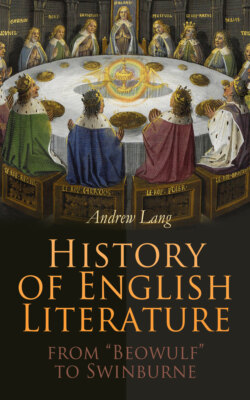Читать книгу History of English Literature from "Beowulf" to Swinburne - Andrew Lang, Robert Kirk - Страница 79
На сайте Литреса книга снята с продажи.
Dunbar.
ОглавлениеWilliam Dunbar, whom Scott declared to be the greatest poet of Scotland prior to Robert Burns, took the degree of Bachelor of Arts at St. Andrews in 1477. Much later, lads of seventeen or even of fourteen, graduated, so Dunbar may have been born (in East Lothian) so early as 1460. His language, with some southern English tincture, is that of the most Anglicized part of Scotland. The Earls of Dunbar were a great shifting power on the Border, and Dunbar's name, at least, was noble, he may have come of Cospatrick's line (Earls of March).
A favourite Scottish form of verse was the "Flyting" (scolding) or humorous raillery, and Dunbar's opponent, Walter Kennedy, represented a very old Celtic clan of Galloway and Ayrshire: Dunbar banters him on his "Irish" dress and accent. Dunbar was brought up to be a Churchman, and was a novice in the Order of St. Francis, "begging with a pardon in all Kirks". From 1479 to 1491, he was travelling abroad, preaching and begging in France, far from honestly, he says:—
"I wes ay reddy all men to begyle," like Chaucer's Pardoner, but perhaps Dunbar was merely copying Chaucer. He is thought to have been attached to the Scottish Embassy in Paris, and he may have read, in print, the works of the famous burglar poet, Francois Villon. His recognized Masters, however, were Chaucer, Gower, and Lydgate.
From 1500 to the great defeat of Flodden (1513) and the death of James IV, Dunbar was a priest and poet at the Court of that magnificent prince, in whose days Scotland was peaceful, comparatively rich, and addicted to letters and the arts. Her poets, a century after Chaucer, and eighty years after their Royal leader, James I, were all Chaucerians, but were confessedly more vigorous, tuneful, more original in genius, and much less prolix and pedantic than the English Chaucerians, Lydgate, Gower, and Hawes. But what Dunbar lacks in length, he more than makes up for in breadth. He made Court poems on the Royal marriage of "The Thistle and the Rose" (Margaret, the Rose, was really as prickly as the Thistle). He was but thriftily rewarded, and emitted many rhymed petitions for money. Benefice he got none.
Probably, like Dean Swift, he was thought no credit to his cloth, even in days far from respectable. As Chaucer was styled "Old Grizzle," so the Scot speaks of himself as "this gray horss, Auld Dunbar". At about 48, and in sickness, he wrote his "Lament for the Makaris," the dead "makers" or poets, including Chaucer, Gower, and Lydgate, with the recurring burden, Timor mortis conturbat me, "Fear of Death disturbeth me". In 1511 he was with the Queen at her reception in Aberdeen, which he celebrated, as he had already made immortal the filth and stench of Edinburgh, a town famous for its dirt till after Dr. Johnson's time. His humorous poems, his satires on society and clergy, are coarser than the English poetic attacks. His Three Wanton Wives, "Two Married Women and the Widow," is inspired by Chaucer's "Wife of Bath's Tale," or rather by the prologue.
Historically, these poems are full of matter, with their pictures of a society not more pure than that to which Piers Plowman preached, but they have not the gentle and humane wit of Chaucer. Like all the poets following Chaucer, Dunbar shines in descriptions of gardens and woods in spring, though May, in Scotland, is not always what his fancy painted it, indeed these vernal glories are borrowed from the verse of sunny France—
The sun rises fair in France,
And fair sets he,
But he has tint the bonny blink
He has in my ain countrie,
writes the Jacobite exile, accustomed at home, only to a "blink" or gleam of the sun through clouds. After 1520, or thereabouts, Dunbar saw no more of the sun.
Dunbar, with his satires, "flytings," Court poems, allegories of the usual kind, rhymed petitions, poems of penitence and faith, and the rest, was versatile enough, and wrote in many forms of verse, even in the old unrhymed alliterative cadences ("The tua Mariit Wumen and the Wedo"). To his glory be it said that this, his longest piece, is only of 530 lines. He also used the heroic rhymed couplet, "Riding Rhyme," and the rhymed octosyllabic couplet, strophes of various arrangements, and even the tripping French triolet.
One allegorical poem, "The Golden Targe," full of classical mythology and the usual praise of May, contains the lines
O reverend Chaucere, Rose of rethoris all,
As in our tong are flour imperiall,
"rethoris," being masters of rhetoric.
Dunbar escapes from Venus and other gods, and from a crowd of allegorical people—including Danger, of course,—at the end of 278 lines. Apparently Scotland did not love the long-winded style. The "flyting" combines with rhyme copious alliteration.
For wealth of strange coarse terms of abuse Dunbar may compare with Urquhart, the translator of Rabelais. A poem to the young Queen is unspeakably nauseous. In short to be plain, it is not easy to see why Dunbar has been reckoned above James I and Henryson; while Barbour, with a chivalrous heart and a spirited story, is infinitely more agreeable and profitable than the Court-haunting priest of James IV. In Scotland, Dunbar at no time has been so popular as the poets already mentioned. He praises Chaucer, but the lesson of Chaucer he never fully learned.
